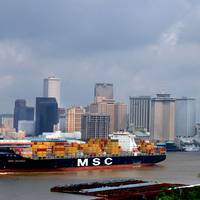Glycerin Powers into the Propulsion Picture
Maine Maritime Academy Receives a $1.4 Million U.S. DOT Research Grant to Develop a Marine Engine Testing and Emissions Laboratory. The Marine Engine Testing and Emissions Laboratory (METEL) at Maine Maritime Academy (MMA) is working on several initiatives to implement viable emissions reduction technologies for the marine industry. Funded by a $2.8 million grant from the U.S. Department of Transportation, the METEL laboratory was developed to address environmental sustainability needs in transportation. Working with a Maine startup company, Sea Change Group LLC (SCG), the METEL team is helping to develop and implement a fuel that combines glycerin with diesel fuel to lower both operating cost and emissions for marine diesel engines.
Port, UNO Host 1st Annual Maritime Workforce Summit

Summit Set for October 8, 2014 at UNO’s Lindy Boggs International Conference Center from 8:30 a.m. until 12:30 p.m. With a focus on educating and engaging community stakeholders on maritime jobs opportunities, the Board of Commissioners of the Port of New Orleans and the University of New Orleans will host the 1st Annual Port of New Orleans Maritime Workforce Summit October 8. Moderated by Mark Romig, President and CEO of the New Orleans Tourism and Marketing Corp., summit participants include state and local education officials…
$42M in Grants for Ferry Docks & Facilities
U.S. Transportation Secretary Ray LaHood today announced more than $42m in grants to improve ferry service and build new docks and facilities in 15 states and Puerto Rico. Congress authorized the Federal Highway Administration’s Ferry Boat Program was created to fund ferry boat projects that provide critical access to areas that lack other means of transportation where high passenger demand already exists. Program funds can be used for capital improvements to existing ferry operations which could increase the number of riders, relieve congestion or address environmental or significant operational concerns. The projects include funding…
Va School to Introduce Training Center in 2008
According to the Daily Press, Tidewater Community College on Wednesday announced a new training center designed to help alleviate anticipated critical workplace shortages in shipbuilding and other waterfront related work. The Maritime and Transportation Center, set to open in 2008, will operate out of a building at the community college's forthcoming campus in Portsmouth -- training workers in everything from welding to truck driving, from computer aided design to port security. Shipyard workers are expected to be in great demand over the coming decades. Baby boomers are approaching retirement age even as Navy shipbuilding is going strong with an entirely new aircraft carrier class at Northrop Grumman Newport News and continued submarine building there.
Panama Canal Administrator Briefs Asia
In a speech delivered to influential business leaders, the Administrator of the Panama Canal, Alberto Alemán Zubieta, briefed members of the American Institute for Shippers' Associations (AISA) on the state of the Panama Canal and the importance of Panama as a logistics and transportation center. Alemán highlighted the Canal's increasing importance to global trade - particularly cargo coming from Asia - and impressive record of creating operational efficiencies, executing the Canal's vast modernization program and improving Canal safety. Of late, the Panama Canal Authority (ACP) has shifted its model by operating the Canal as a business and has made tremendous progress in shortening transit time and reducing accidents.
Panama Canal Appoints Diverse Members to Board
The Panama Canal Authority (ACP) has appointed six new members to its Advisory Board adding it diversity with members from business, transportation, academia and maritime shipping. The Advisory Board was founded in 1999 at the time of the transfer of the Canal to Panamanian administration. The members of the Advisory Board provide strategic counsel to the ACP and the Board of Directors on various important issues that relate to the management and administration of the Canal including finances, insurance, operations and permanent modernization. The new members are: Admiral William J. Flanagan, Jr., Ret., U.S. Navy, Former Commander-in-Chief, U.S. Atlantic Fleet; Dr. Ernst Frankel, Professor Emeritus in Ocean Systems and Professor of Management, Massachusetts Institute of Technology; Dr.
Northwestern University Center To Open
Neptune Orient Lines (NOL), an early donor to the Northwestern University Transportation Center's "Building for the Future" campaign, is joining other supporters in celebrating the dedication this month of the center's new 20,000-square-foot headquarters building. A conference room in the building will be named in honor of NOL, which gave $100,000 to the center's campaign. Approximately $75,000 went toward the building, while $25,000 was designated for research fellowships at the center. For several years, Singapore-based NOL has sent its staff members to executive seminars and courses at the center. NOL is currently a member of the center's Business Advisory Committee, and has contributed to the center's operating budget since 1992.
Linking Fast Ferries into the Public Transport Network
Located along the mid coast of the Northeast U.S., New London, Conn. has long been a center for ferry transportation dating back to the early days of passenger travel via sailing schooner, steamship and rail ferries. New London's naturally sheltered, deep water harbor allowed it to develop into a major marine travel hub and established it as a major stopping point between the metropolitan areas of New York City and Boston. Confronted by an ever-growing population, an increase in highway congestion and related pollution from emissions, and continued reliance on automobile travel, New London, with its unique geographic location and accessibility to multiple modes of transport, finds itself in the transportation forefront once again.





